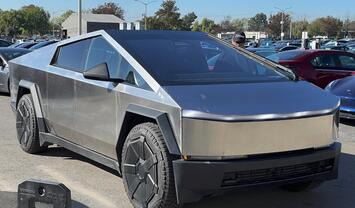
In 2014, Tony Seba, an author and lecturer in “entrepreneurship, disruption, and clean energy” at Stanford University, declared, “By 2025, gasoline engine cars will be unable to compete with electric vehicles.” He continued, claiming that internal combustion engine (ICE) vehicles “are toast.” In a 14-page presentation called “Clean Disruption of Energy and Transportation,” that was subtitled, “How Silicon Valley is making oil, nuclear, natural gas, coal, electric utilities and conventional cars obsolete — by 2030,” Seba claimed “solar, wind, electric vehicles, and autonomous (self-driving) cars will disrupt and sweep away the energy industry as we know it.” He also declared that “Transportation will never be the same again” and that “energy and transportation as we know it today will be history by 2030.”
A decade later, Seba’s predictions look rather, um, optimistic.
Yes, we have about five years left before Seba’s 2030 deadline, but as I noted in my last Substack, “Natty Nation,” U.S. natural gas production — and LNG exports! — are at record levels. As I have reported many times over the past decade, the solar and wind sectors are facing increasing friction in rural communities all over the world. (See my April 3 piece on Fox News for more.) Robot cars? Last week, policymakers in British Columbia banned self-driving cars. Oil use? On April 9, the Energy Information Administration reported that global oil consumption averaged 102 million barrels per day in 2023, an amount that was “a 2.0 million b/d increase from 2022.” The agency also predicted global oil use will be about 103 million b/d this year and about 104 million b/d in 2025.
We can already see that Seba’s prediction that “By 2025, gasoline engine cars will be unable to compete with electric vehicles” was dead wrong.
Yes, 1.2 million EVs were sold in the U.S. last year. That’s a record number. But after more than a century in the market, EVs accounted for just 7.6% of U.S. new car sales. And yes, Cox Automotive believes that EVs will account for about 10% of new car sales in 2024. That prediction may be too optimistic.
Understanding why that’s so only requires looking at the troubles at Tesla, which accounted for 55% of all U.S. EV sales last year. Tesla’s closest competitor last year was Ford, which accounted for just 6% of the U.S. EV market, and as I noted in February, FoMoCo lost nearly $65,000 for each of the 72,000 EVs it sold last year. Meanwhile, EV maker Rivian lost a whopping $107,000 for every vehicle it sold. (Rivian’s stock has fallen by more than half this year.)
Put simply, Tesla is the bellwether for the EV business, and it’s in trouble. Last week, the company announced it was laying off more than 10%, or about 14,000, of its employees. The move comes after a quarter during which the company missed delivery expectations and just before it reveals its quarterly profits on Tuesday.
Read the rest of this piece at Robert Bryce Substack.
Robert Bryce is a Texas-based author, journalist, film producer, and podcaster. His articles have appeared in a myriad of publications including the Wall Street Journal, New York Times, Forbes, Time, Austin Chronicle, and Sydney Morning Herald.
Photo: Wikimedia under CC 4.0 License.












